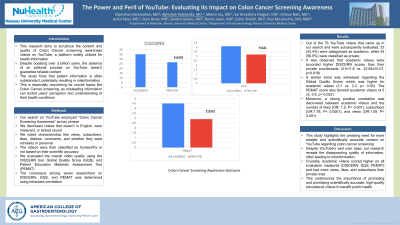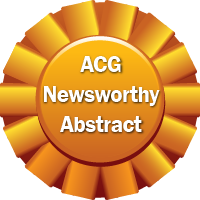Sunday Poster Session
Category: Colorectal Cancer Prevention
P0350 - The Power and Peril of YouTube: Evaluating Its Impact on Colon Cancer Screening Awareness
Sunday, October 22, 2023
3:30 PM - 7:00 PM PT
Location: Exhibit Hall

Has Audio
- AT
Abhishek Tadikonda, MD
Nassau University Medical Center
East Meadow, New York
Presenting Author(s)
Rajmohan Rammohan, MD, Melvin Joy, MD, Sai Greeshma Magam, MD, Dilman Natt, MD, Tulika Saggar, MD, Abhishek Tadikonda, MD, Achal Patel, MD, Jiten Desai, MD, Sandra Gomez, MD, Rucha Jiyani, MD, Saher Sheikh, MD, Paul Mustacchia, MD, MBA
Nassau University Medical Center, East Meadow, NY
Introduction: This research aims to scrutinize the content and quality of Colon Cancer screening awareness videos on YouTube, a platform widely utilized for health information. Despite boasting over a billion users, the absence of an editorial process on YouTube doesn't guarantee reliable content. The study finds that patient information is often substandard, potentially resulting in misinformation. This is especially concerning for crucial topics like Colon Cancer screening, as misleading information can distort users' perception and understanding of their health conditions.
Methods: Our search on YouTube employed "Colon Cancer Screening Awareness" as key phrase. We dismissed videos that weren't in English, were irrelevant, or lacked sound. We noted characteristics like views, subscribers, likes, dislikes, comments, and whether they were scholarly or personal. The videos were then classified as trustworthy or not based on their scientific accuracy. We evaluated the overall video quality using the DISCERN tool, Global Quality Score (GQS), and Patient Education Materials Assessment Tool (PEMAT). The consensus among seven researchers on DISCERN, GQS, and PEMAT was determined using intraclass correlation.
Results: Out of the 76 YouTube videos that came up in our search and were subsequently evaluated, 33 (43.4%) were categorized as academic, while 43 (56.5%) were classified as private. It was observed that academic videos were accorded higher DISCERN scores than their private counterparts (31±11.6 vs. 22.64±10.07, p=0.018). A similar trend was witnessed regarding the Global Quality Score, which was higher for academic videos (3.1 vs. 2.2, p< 0.05). The PEMAT score also favored academic videos (4.5 vs. 3.9, p= 0.022). Moreover, a strong positive correlation was discovered between academic videos and the number of likes (OR: 1.5, P< 0.001), subscribers (OR:1.78, P< 0.0001), and views (OR:1.09, P< 0.001).
Discussion: This study highlights the pressing need for more reliable and scientifically accurate content on YouTube regarding colon cancer screening. Despite YouTube's vast user base, our research reveals the disappointing quality of information, often leading to misinformation. Crucially, academic videos scored higher on all evaluation measures (DISCERN, GQS, PEMAT) and had more views, likes, and subscribers than private ones. This underscores the importance of promoting and prioritizing scientifically accurate, high-quality educational videos to benefit public health.

Disclosures:
Rajmohan Rammohan, MD, Melvin Joy, MD, Sai Greeshma Magam, MD, Dilman Natt, MD, Tulika Saggar, MD, Abhishek Tadikonda, MD, Achal Patel, MD, Jiten Desai, MD, Sandra Gomez, MD, Rucha Jiyani, MD, Saher Sheikh, MD, Paul Mustacchia, MD, MBA. P0350 - The Power and Peril of YouTube: Evaluating Its Impact on Colon Cancer Screening Awareness, ACG 2023 Annual Scientific Meeting Abstracts. Vancouver, BC, Canada: American College of Gastroenterology.
Nassau University Medical Center, East Meadow, NY
Introduction: This research aims to scrutinize the content and quality of Colon Cancer screening awareness videos on YouTube, a platform widely utilized for health information. Despite boasting over a billion users, the absence of an editorial process on YouTube doesn't guarantee reliable content. The study finds that patient information is often substandard, potentially resulting in misinformation. This is especially concerning for crucial topics like Colon Cancer screening, as misleading information can distort users' perception and understanding of their health conditions.
Methods: Our search on YouTube employed "Colon Cancer Screening Awareness" as key phrase. We dismissed videos that weren't in English, were irrelevant, or lacked sound. We noted characteristics like views, subscribers, likes, dislikes, comments, and whether they were scholarly or personal. The videos were then classified as trustworthy or not based on their scientific accuracy. We evaluated the overall video quality using the DISCERN tool, Global Quality Score (GQS), and Patient Education Materials Assessment Tool (PEMAT). The consensus among seven researchers on DISCERN, GQS, and PEMAT was determined using intraclass correlation.
Results: Out of the 76 YouTube videos that came up in our search and were subsequently evaluated, 33 (43.4%) were categorized as academic, while 43 (56.5%) were classified as private. It was observed that academic videos were accorded higher DISCERN scores than their private counterparts (31±11.6 vs. 22.64±10.07, p=0.018). A similar trend was witnessed regarding the Global Quality Score, which was higher for academic videos (3.1 vs. 2.2, p< 0.05). The PEMAT score also favored academic videos (4.5 vs. 3.9, p= 0.022). Moreover, a strong positive correlation was discovered between academic videos and the number of likes (OR: 1.5, P< 0.001), subscribers (OR:1.78, P< 0.0001), and views (OR:1.09, P< 0.001).
Discussion: This study highlights the pressing need for more reliable and scientifically accurate content on YouTube regarding colon cancer screening. Despite YouTube's vast user base, our research reveals the disappointing quality of information, often leading to misinformation. Crucially, academic videos scored higher on all evaluation measures (DISCERN, GQS, PEMAT) and had more views, likes, and subscribers than private ones. This underscores the importance of promoting and prioritizing scientifically accurate, high-quality educational videos to benefit public health.

Figure: COLON CANCER SCREENING AWARENESS OUTCOME
Disclosures:
Rajmohan Rammohan indicated no relevant financial relationships.
Melvin Joy indicated no relevant financial relationships.
Sai Greeshma Magam indicated no relevant financial relationships.
Dilman Natt indicated no relevant financial relationships.
Tulika Saggar indicated no relevant financial relationships.
Abhishek Tadikonda indicated no relevant financial relationships.
Achal Patel indicated no relevant financial relationships.
Jiten Desai indicated no relevant financial relationships.
Sandra Gomez indicated no relevant financial relationships.
Rucha Jiyani indicated no relevant financial relationships.
Saher Sheikh indicated no relevant financial relationships.
Paul Mustacchia indicated no relevant financial relationships.
Rajmohan Rammohan, MD, Melvin Joy, MD, Sai Greeshma Magam, MD, Dilman Natt, MD, Tulika Saggar, MD, Abhishek Tadikonda, MD, Achal Patel, MD, Jiten Desai, MD, Sandra Gomez, MD, Rucha Jiyani, MD, Saher Sheikh, MD, Paul Mustacchia, MD, MBA. P0350 - The Power and Peril of YouTube: Evaluating Its Impact on Colon Cancer Screening Awareness, ACG 2023 Annual Scientific Meeting Abstracts. Vancouver, BC, Canada: American College of Gastroenterology.

